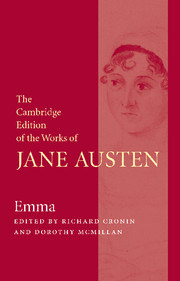Chapter 12
Published online by Cambridge University Press: 18 December 2020
Summary
TILL now that she was threatened with its loss, Emma had never known how much of her happiness depended on being first with Mr. Knightley, first in interest and affection.— Satisfied that it was so, and feeling it her due, she had enjoyed it without reflection; and only in the dread of being supplanted, found how inexpressibly important it had been.— Long, very long, she felt she had been first; for, having no female connexions of his own, there had been only Isabella whose claims could be compared with hers, and she had always known exactly how far he loved and esteemed Isabella. She had herself been first with him for many years past. She had not deserved it; she had often been negligent or perverse, slighting his advice, or even wilfully opposing him, insensible of half his merits, and quarrelling with him because he would not acknowledge her false and insolent estimate of her own—but still, from family attachment and habit, and thorough excellence of mind, he had loved her, and watched over her from a girl, with an endeavour to improve her, and an anxiety for her doing right, which no other creature had at all shared. In spite of all her faults, she knew she was dear to him; might she not say, very dear?—When the suggestions of hope, however, which must follow here, presented themselves, she could not presume to indulge them. Harriet Smith might think herself not unworthy of being peculiarly, exclusively, passionately loved by Mr. Knightley. She could not. She could not flatter herself with any idea of blindness in his attachment to her. She had received a very recent proof of its impartiality.—How shocked had he been by her behaviour to Miss Bates! How directly, how strongly had he expressed himself to her on the subject!—Not too strongly for the offence—but far, far too strongly to issue from any feeling softer than upright justice and clear-sighted good will.—She had no hope, nothing to deserve the name of hope, that he could have that sort of affection for herself which was now in question; but there was a hope (at times a slight one, at times much stronger,) that Harriet might have deceived herself, and be overrating his regard for her.
- Type
- Chapter
- Information
- Emma , pp. 452 - 461Publisher: Cambridge University PressPrint publication year: 2005

